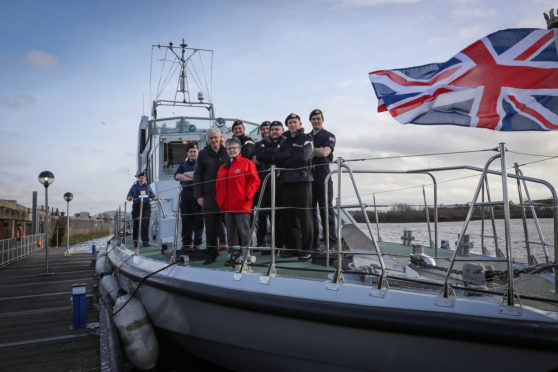You need to read this column whilst making room in your head for a quick burst of the Village People singing “In the Navy”.
That is what is playing in my head right now as I reflect on a five day visit to the Royal Navy in Scotland.
The song was of course, written for the US Navy as an aid to recruitment.
For some reason however, while it made it to the top of the charts, the ditty never quite made it to the dizzy heights of a Naval advert.
But the lyrics do point to many of the things a naval career has to offer both men and women – a few of which I managed to experience first-hand.
Before revealing these adventures to you, let me throw a few questions your way to test your knowledge of the oldest of our military organisations.
How many arms does the Royal Navy have? Who or what is a Bish? Or a Skimmer?
True or false: if you join the Navy you need to be willing to relocate regularly?
I am not particularly up on any of the services and so my trip to bases in Rosyth and to Faslane was an education right from the word ‘go’.
I learned that there are five arms to the Royal Navy for example.
There are the ships of the Surface Fleet. There is the Fleet Air Arm flying the helicopters and other aircraft. There are the Royal Marines, the Submarine Service and the Royal Fleet Auxiliary.
Each of these arms has its own distinct area of expertise and its own distinct identity too and there is a fair bit of banter between the members of these different sections.
A ‘Bish’ is the friendly name sailors use for chaplains and a ‘Skimmer’ is a sailor in the Surface Fleet.
Did you know that a chaplain in the Royal Navy doesn’t have a rank?
He or she adopts the rank of whoever they are speaking to and the Chaplain is the second oldest role on board.
If you wanted to embark on a naval career, it is perfectly possible for you to serve your time in, for example, Scotland alone.
In fact, in the not too distant future, a third of the entire Royal Navy will be based in Scotland as the second biggest employer in our land.
It was a real privilege for me to be able to see so many different aspects of life in the Navy and to talk to those of every rank and their families.
I am not sure I had quite appreciated all the roles our Navy fulfils and I was utterly blown away by their humanitarian emphasis and by the breadth of their technical skills and knowledge.
Not just in defence, but in the likes of keeping shipping channels open, seabed mapping and oceanography – not to mention all sorts of engineering expertise on, below and above sea level.
That said, there is no escaping that the regular ‘tools’ of the Royal Navy trade are weapons of war and the training of people to use them efficiently.
Since that is the case, there are questions that continually need to be asked around expenditure, levels of weaponry, their impact and use, as well as the training and support of those expected to put them into operation.
It was good to discover that the Royal Navy takes these things too, incredibly seriously and has an ethics group which is given the space, time and resources to grapple with these very issues.
The churches too, from a faith perspective, do the same and through their chaplains are represented at the discussions on a national level.
When it comes to the people in the pews however, while all recognise and value the work that our service personnel undertake and value too the safeguards they offer, there are some who are more welcoming of the military machine that is our armed services than others.
Whatever their opinion, the views held will be held in response to what people think their faith demands.
That means that we need to listen to each other. Talk things through and not discount those whose views differ from our own.
So… what did I do?
I donned a survival one-size suit to swim to a life-raft.
I drove a patrol vessel up the Clyde.
I survived a submarine simulator: saw round the brand new HMS Prince of Wales aircraft carrier and the still to be built HMS Glasgow.
More importantly, I met people willing to get alongside service personnel and their families in the midst of real life – wherever they are.
In the Navy, you can sail the seven seas – but you can also, every wave of the way, be supported by your Bish.
Right Rev Susan Brown is moderator of the General Assembly of the Church of Scotland

